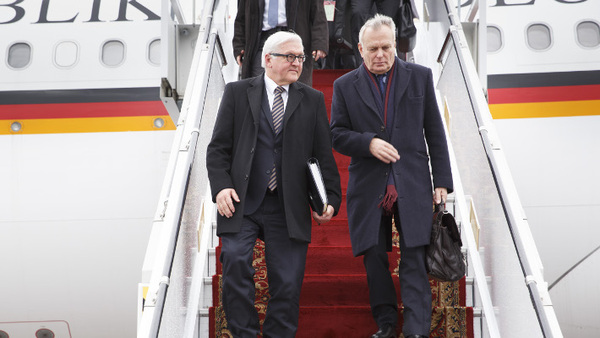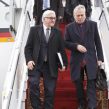
Berlin and Paris Soften up Kyiv Ahead of ‘Decisive’ Normandy Meeting
Publication: Eurasia Daily Monitor Volume: 13 Issue: 39
By:

In Kyiv, on February 22–23, with a working visit, German Minister of Foreign Affairs Frank-Walter Steinmeier portrayed the “Normandy” group’s upcoming March 3 meeting in Paris as a make-or-break event, designed to overcome the diplomatic deadlock over “the Ukraine crisis.” The diplomatic process is stuck in a crisis of its own, Steinmeier suggested: “We are unhappy with the process in recent months, but we do not see alternatives to these [Minsk] agreements. The Paris meeting will be a key meeting, a decisive meeting, where we must take some steps to preserve trust in the process itself” (Ukrainian TV Channel Five, February 22). Moreover, he declared, “We must take decisive steps on March 3. All the people in Ukraine, Europe and the whole world are expecting success at the Paris meeting” (Ukrinform, February 23).
Such rhetoric is dramatically raising the stakes for the parties involved and even inflating universal expectations of a sudden diplomatic breakthrough by a certain date—an imminent date at that. It looks like a textbook case of diplomatic blundering. In this particular situation, however, Steinmeier’s rhetoric in Kyiv seems designed to increase pressure on Ukraine to accept certain joint proposals of Russia, Germany and France at the upcoming “Normandy” meeting (see below).
Top-level German diplomacy stops shy of telling the Russians in their own capital that Europe and the world expect Russia to stop its war in Ukraine’s east (and by a specific date). Steinmeier’s ministry systematically avoids identifying Russia as a party to this conflict. Conversely, descending on Kyiv with an urgent message to make “compromises” is a form of one-sided German pressure on Ukraine, ahead of what Berlin describes as a decisive meeting.
Kyiv has tenaciously resisted proposals to legitimize and legalize the Donetsk-Luhansk “people’s republics” in the Minsk Contact Group in recent months. As seen from Berlin and Paris, this is “deadlock.” Those proposals are billed as Ukraine’s political “obligations” under the Minsk armistice. The Normandy forum ranks above the Minsk group in the terms of reference of both these processes. The Normandy group (in practice the trio of Russia, Germany and France) has the authority to provide the Minsk Contact Group with guidelines. The Normandy meeting in Paris seems designed to break Kyiv’s holding action in the Minsk negotiations (see EDM, February 19, 23, 25).
The general pattern of negotiations in the Normandy format has seen Russia, Germany and France presenting a common front with joint proposals, from time to time cornering Ukraine. The Kremlin avoids launching major proposals of its own in this format. Instead it uses the Normandy group for the diplomatic equivalent of attrition warfare, pushing Ukraine into a series of piecemeal concessions that would cumulatively lead to an outcome on Russia’s terms.
With Jean-Marc Ayrault, the new French minister of foreign affairs, tagging along in Kyiv, Steinmeier hinted at proposals that the Ukrainians will face at that meeting. The focus will be on accelerating preparations for “elections” to be staged in Ukraine’s Russian-controlled territory. This means pressuring Kyiv, first, into agreeing with the Donetsk and Luhansk “people’s republics” on a special law on elections, applicable to that territory, outside Ukraine’s existing constitutional and legal framework. That is the purpose of the French-proposed, Russian- and German-endorsed Morel plan, which Ukraine is resisting in the Minsk Contact Group, but which will be pressed more strongly on Ukraine at the upcoming Normandy meeting (Unian, Ukrinform, February 22–24).
Secondly, the Normandy powers are expected to ask Ukraine, on March 3, to complete the enactment of a blanket amnesty for war-related crimes of Russia’s proxies in Donetsk-Luhansk. An amnesty would enable those proxies to be elected locally in the “people’s republics,” facilitate the validation of those elections (if staged with Kyiv’s unwilling consent), and would qualify those proxies to take up seats in the Ukrainian parliament in Kyiv, the crowning step of “reintegrating” Donetsk-Luhansk into Ukraine. And thirdly, Ukraine will probably be asked to enact the pending constitutional amendment on local self-government in the Russian-controlled territory. The three Normandy powers envision a political solution along such lines, backed up by Ukrainian subsidies to the Donetsk-Luhansk authorities.
Officially, the implementation of the Minsk armistice is supposed to proceed along two parallel tracks. The political track involves mainly Ukrainian “obligations,” while the military track involves nonbinding promises, logically imputed to Russia, but without naming it. Ukraine equally logically wants Russia to withdraw its forces and allow Ukraine to regain control of its side of the border, as prerequisites to a political and constitutional solution for Donetsk-Luhansk. For their part, Steinmeier and Ayrault insisted in Kyiv that the political and military implementation are “parallel processes” (Ukrinform, February 23). This means, in practice, that Ukraine can hope to negotiate a partial withdrawal of Russian forces (while some of them would stay under Donetsk-Luhansk flags) in return for a “political solution” that would sacrifice parts of Ukraine’s sovereignty in that territory. This “parallel-tracks” process is a déjà vu of the “synchronization process” that Russia imposed on Moldova in the 1990s with regard to Transnistria. The Kremlin would withdraw its troops and allow Moldova to regain nominal sovereignty there, in “synchronization” with Moldova accepting Transnistria’s far-reaching autonomy (“federalization”), with blocking powers for Transnistria over the central government.
The “parallelism” suggested by Germany and France is even less realistic than the “synchronization” that came to nothing in Moldova. Clearly, Berlin and Paris have neither the will nor the means to obtain Russia’s compliance with the military clauses of the Minsk armistice. Consequently, there are no negotiations in any format about what would happen with the powerful armed forces under Donetsk-Luhansk flags, in the event of a “political solution” as discussed in the Normandy, Minsk and other formats. Staffed and manned by combined Russian and secessionist personnel, the Donetsk-Luhansk forces are among the strongest in all Europe in terms of heavy artillery, armor and multiple-rocket systems. No Western government or organization is in a position to tell Ukraine that the Donetsk and Luhansk “people’s republics” and “their” armed forces would go away, once Kyiv legitimizes them. They are, instead, likely to become more deeply entrenched. Ukraine is being asked to make self-damaging political concessions for nothing in return—if anything, for even more troubles ahead.




